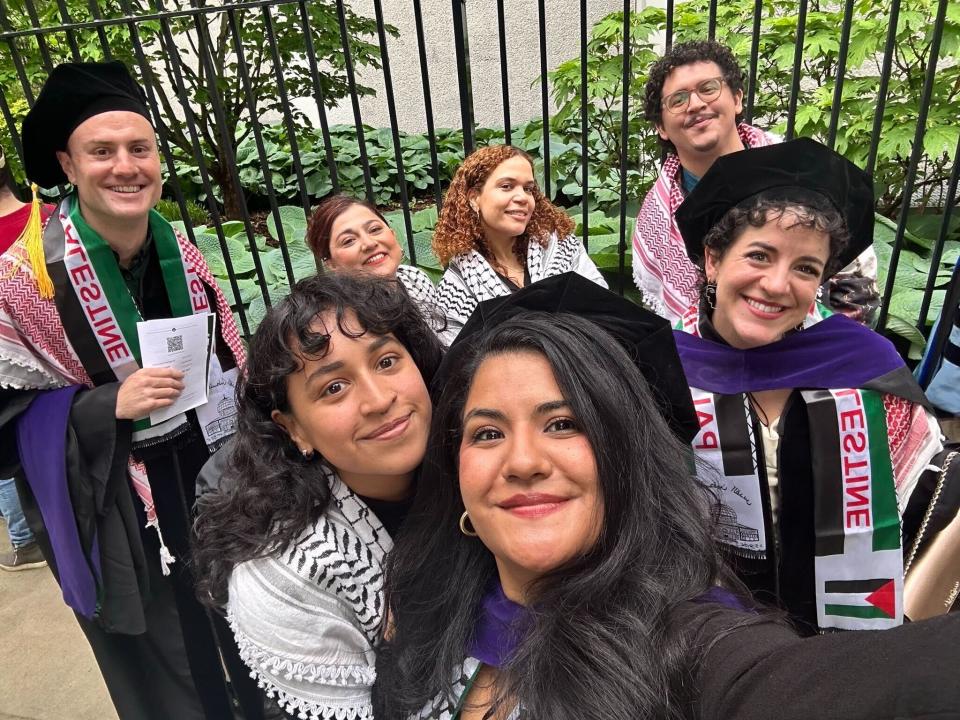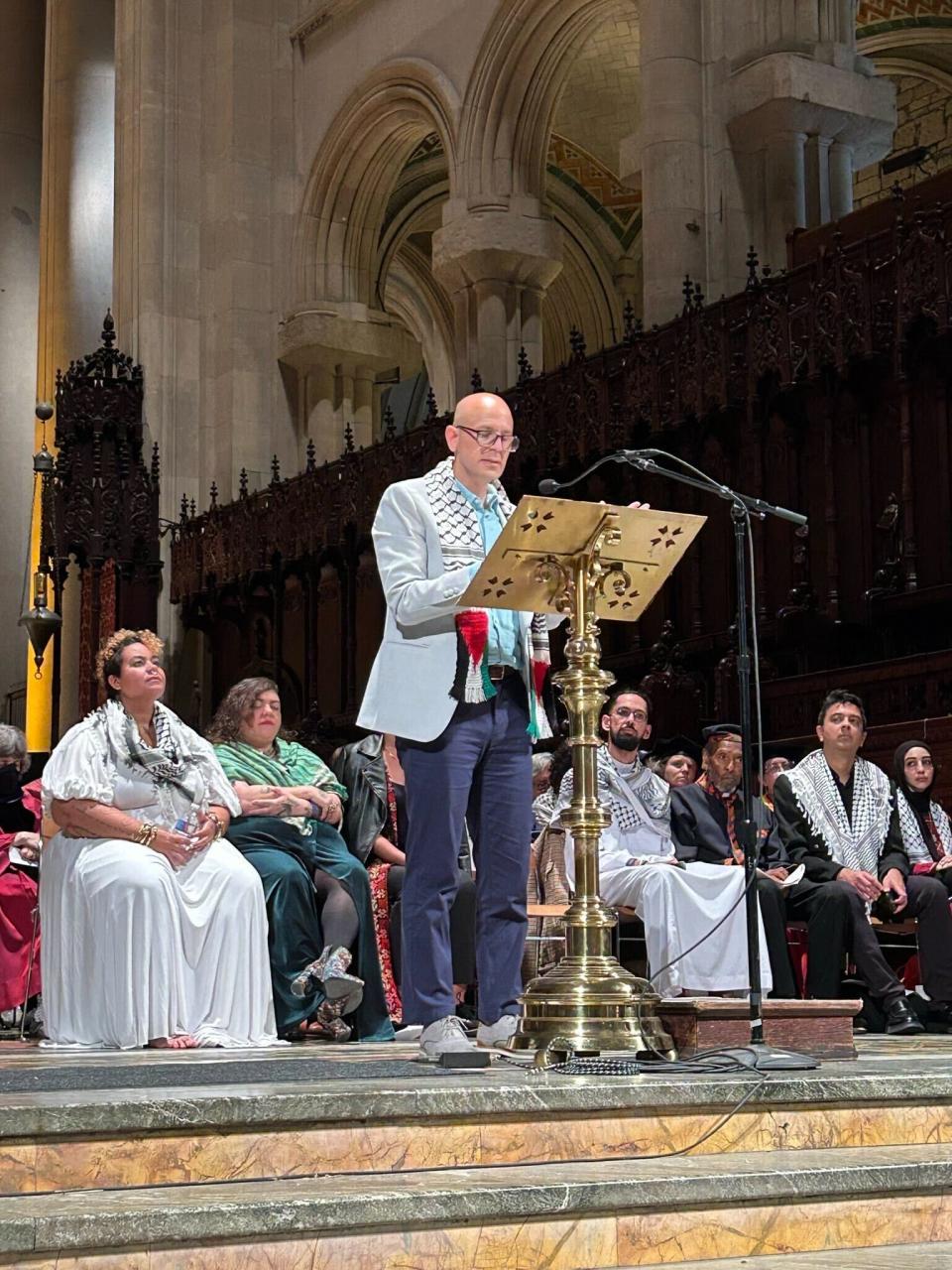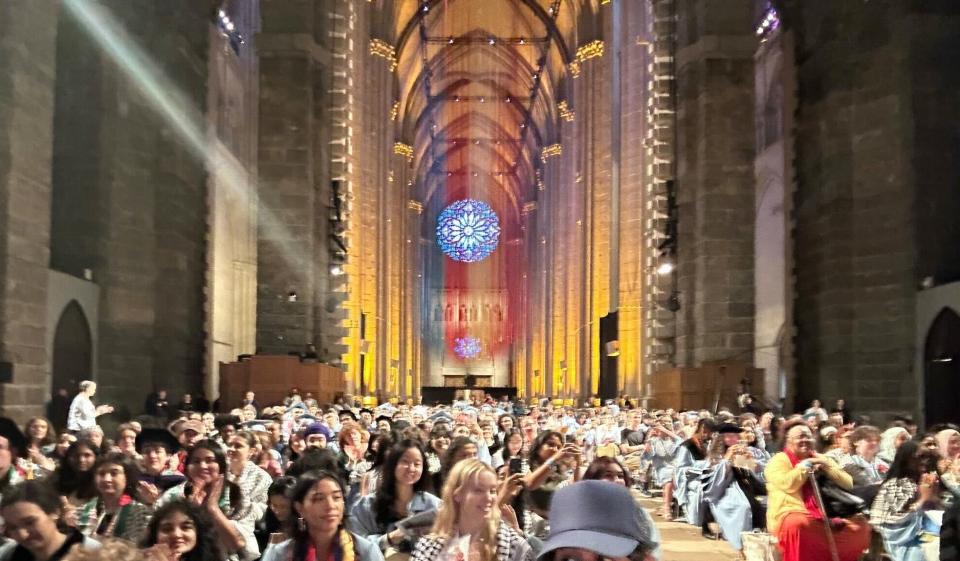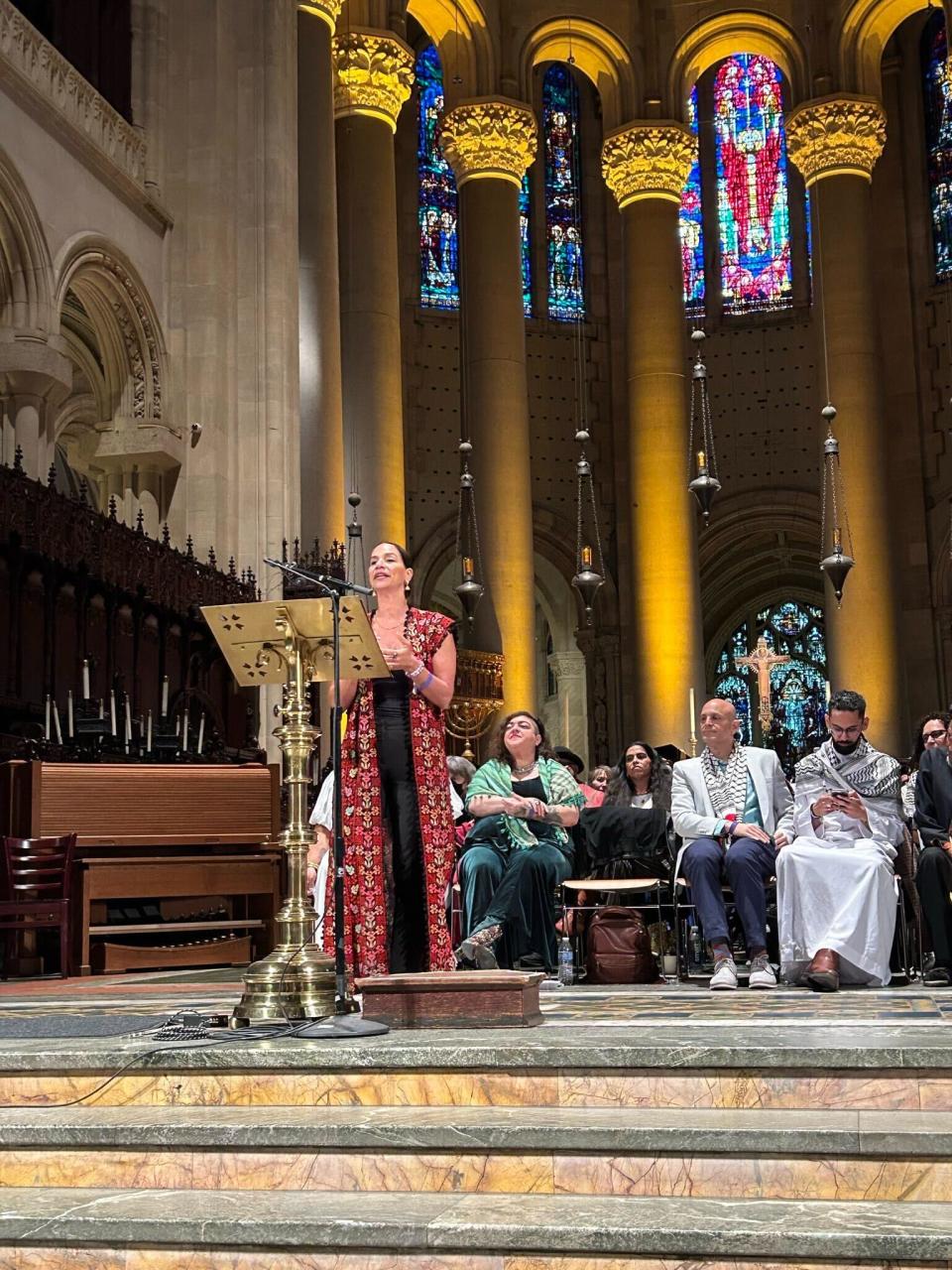Columbia Faculty Host "People's Graduation" for Punished Pro-Palestine College Protest Students

- Oops!Something went wrong.Please try again later.
- Oops!Something went wrong.Please try again later.
- Oops!Something went wrong.Please try again later.
Alex Kent/Getty Images
It's college graduation season, but some students who participated in on-campus protests for Palestine saw their semester end without one. That’s why a group of Columbia faculty and staff members planned what they called a “People’s Graduation.” The event, hosted at the Cathedral of St. John the Divine on May 16, celebrated graduating students from Columbia, City University of New York (CUNY), and New York University, some of whom were unable to participate in their schools’ ceremonies.
Columbia’s full-school commencement ceremony was canceled in early May. According to Barnard professor of religion Najam Haider, one of the People's Graduation organizers, they began strategizing for an independent celebration around April 18, when the university sent NYPD officers in to arrest students for the first time.
“We've been worried about our students. We've been trying to support them however we can,” Haider tells Teen Vogue, listing difficulties that have faced punished students such as food insecurity, evictions, and the presence of the NYPD on campus through the end of the semester.
In the weeks since April 18, more people volunteered to join the event planning and the celebration itself. Haider says they were surprised by the quickness with which big names like advocate Noura Erakat, writer adrienne maree brown, and actor Amanda Seales leapt to participate. The ceremony also included a pre-recorded message from Palestinian journalist Hind Khoudary, thanking the participants for their activism.
Says Haider, “We have so few opportunities to show them our appreciation of them and let them celebrate themselves. I am very proud of these students for what they've done, with what they continue to do, for their moral clarity, for their ability to just see the world as it is and bear witness to it. This is just a small way to show them that we see them.”
Haider also notes that Barnard faculty passed a vote of “no confidence” in Barnard president Laura Rosenbury at the end of April; the same day as the People's Graduation, Columbia Arts and Sciences faculty passed a vote of “no confidence” in university president Minouche Shafik.
NYU Law 2024 grad Ryna Workman was one of multiple students in negotiations with the administration over a library encampment. Workman says they were ultimately barred from participating in any NYU commencement-related events. “Being here at this People's Graduation… was a beautiful refusal of these institutions,” Workman tells Teen Vogue. “This is the kind of thing that I felt during the encampments, and it's just the perfect encapsulation of the future that I want to be a part of."
For students returning to Columbia's campus this fall, such as rising senior Soph Askanase who was among those arrested on April 18, the joyous ceremony was a chance to see their classmates celebrated rather than penalized. “I got to watch one of my incredible friends, someone that I've been organizing alongside for a long time, speak on that stage, and I was in literal tears,” says Askanase.
They’re unsure if they’ll be allowed to graduate next year (“An arrest and a suspension get in the way of things a little bit”), but nonetheless, they say, “I'm looking forward to coming back and continuing to fight. The reason I'm staying here is not because of anyone who's in their ivory towers at Low [Library] right now. It's the people that were in this graduation right now, those faculty, these students: This is why I'm returning.”
Teen Vogue speaks to graduates from the class of 2024 about the People’s Graduation.
These interviews have been lightly edited and condensed for clarity.
Sajia Hanif, CUNY Law School
Hanif is one of eight CUNY Law students suing the law school on the basis of freedom of speech for excluding student-elected speakers at their ceremony; last year’s graduation student-elected speaker gave a speech criticizing Israel.
I found out a few days ago that this was happening, from other organizers. I thought it was amazing, especially when so many of us are getting graduations canceled. Our graduations are being muddled or diminished in some way where there's immense censorship, so we cannot express ourselves in the wake of an ongoing genocide.
It was so healing in a way that I didn't expect…. It was so stunning to watch people who have shared values come together. Standing up for what is right can be extremely isolating when institutions are stacked against you, and it was really nice to know that we have a community of people here together.

You could feel the love in the room, and I think it's something we all needed, when so much hatred is coming toward us from our trustees and our presidents and our deans and our institutions, who are threatening us with all kinds of things. I will never forget this moment for as long as I live. It was beautiful. Everything was grounded in the joy of Palestinian life and liberation. It was really a celebration of Palestinian life, which was, in a way, a celebration of us.
I hope that CUNY Law reinstates our students’ speaker, that CUNY administration drop the charges on all the students that were arrested at the CCNY encampment who are being charged with felonies for the same things that Columbia students are being charged with misdemeanors. I demand divestment from CUNY in the corporations that send weapons off to Israel and support this genocide. For me, I want the institutions to show up, and I demand that they listen to the students because they're not — we're not — going to stop.
Sofia Ongele, Barnard, Class of 2024
Sofia Ongele is the director of digital strategy at Gen-Z for Change.
The only thing that’s kept us together is what this is a testament to, which is community within the encampment, within different spaces that were created on campus as the bombardments were increasing in October. That is what has kept everyone sane and everyone able to continue onward in their lives.
This event, in particular having so many remarkable speakers, being surrounded by folks who had been suspended, had been arrested and weren't allowed in the encampment, but are now back in community with us… it's just been such an insane, remarkable time.



This ceremony — especially given the fact that campus was shut down, all of our graduation ceremonies were somewhere else off-campus just because they didn't want any prospect of interruption — this was a community-centered event, it was a community-built event. It was the people, and there's nothing that's more powerful than that, nothing more remarkable than that. That's the reason that we educate; we educate to liberate.
It's really sad because I feel like in all of my previous ceremonies I went to, it didn't really solidify that I'm actually leaving and I'm not coming back. But this was so wholesome and true to our values that it really does feel like this is the cap to my undergraduate career.
On the note of the solidarity encampments, at this point, it's so much bigger than ourselves. It's something that folks have chosen to malign so they don't have to actively or critically engage with the true reasons that folks have become so engaged, empowered, and distraught with what we're seeing on our screens, basically 24/7, of this onslaught. It's really important for us to continually center Palestinians and colonized peoples throughout all of this. I do genuinely believe the chant that we hear in protest of “Palestine will free us all”: It's a through-line through which we can understand so many other issues.
As we are actively within these institutions of higher learning, it's incredibly imperative that we use our scholastic endeavors to elevate the scholasticide that we're seeing happening in Palestine, specifically the fact there's no universities left, and that central archives are being destroyed so that the memory of Palestinians, the scholarship, their wisdom, is something that is basically wiped off the face of the earth. We must use our position to stand in solidarity with our peers, our professors, our scholars, and Palestine as well.
Editor’s note: Teen Vogue reached out to NYU and CUNY for comment.
In response to a request for comment, a representative for CUNY Law School stated: “In alignment with University policy, The City University of New York School of Law does not comment on pending complaints or litigation. We stand firm in our commitment to combat discrimination in all of its forms — in the work that we do and within our law school community.”
Time quoted an NYU spokesman on the People’s Graduation as saying: “The number of graduating seniors not able to participate in Commencement because of disciplinary sanctions resulting from recent incidents was very small — fewer than a handful…. Even among that very small number of students, not being able to participate in the graduation ceremony does not mean they will not receive their degrees.”
Stay up-to-date with the politics team. Sign up for the Teen Vogue Take
Originally Appeared on Teen Vogue
More great activism coverage from Teen Vogue:

